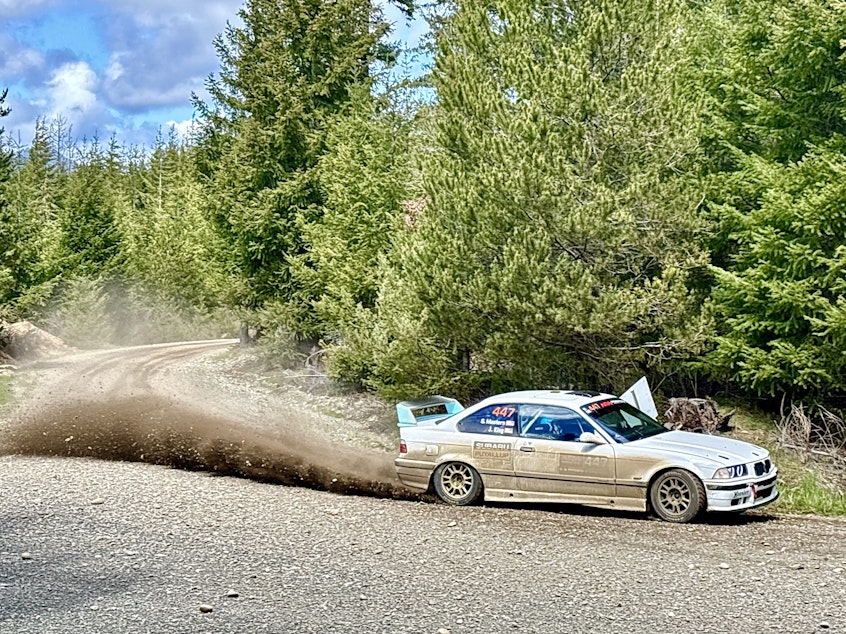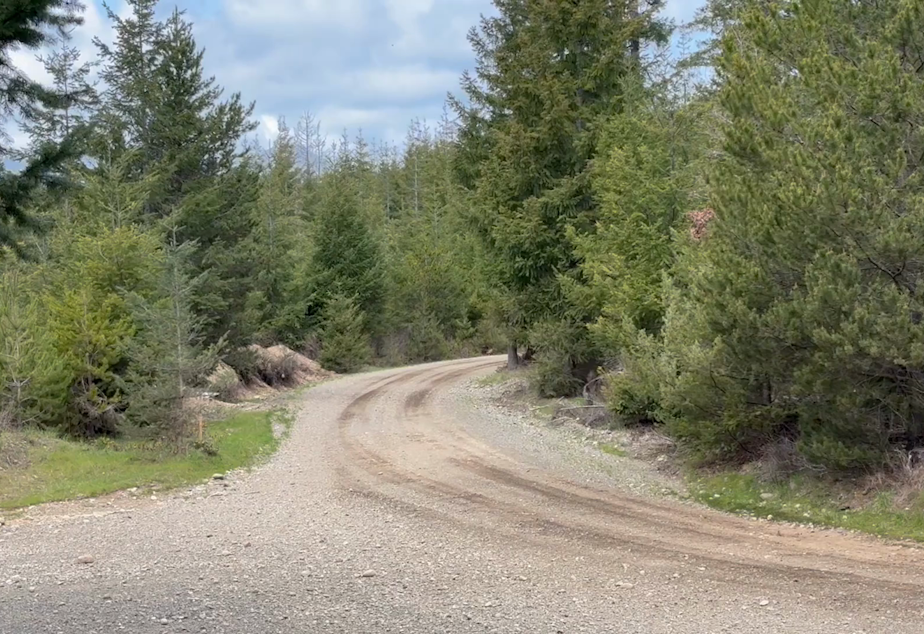Reporter's Notebook: How the Olympus Rally left me in the dust, and in awe

When the "Belltown Hellcat" was caught and charged with reckless driving, I asked my car-enthusiast boyfriend if he knew the guy. That's when I learned a couple things: There are car people who enjoy the sort of high-speed shenanigans that the Hellcat bro tormented Seattle with; and there are car people who are a bit more, shall we say, chill about it.
I got to meet the latter bunch this weekend. I volunteered at the Olympus Rally near Shelton, Wash. It's a two-day rally car race with regional and national stakes. Full disclosure: I don't know a dang thing about rally racing, or cars in general. For folk in the know, this rally is a big deal. It's my boyfriend's favorite weekend of the year.
Now, I get it, y'all.
RELATED: More than 20% of new cars purchased in Washington state are electric
Here's how organizers describe it online: "For over 40 years, we've been hosting a world-class event that sees competitors from around the globe come to race on our twisting long and winding stage roads, some in excess of 20 miles. Join us and experience the rush of adrenaline as drivers compete to be the fastest in the Olympic Forests."
Sponsored
And let me tell you, there was a lot of adrenaline — like when driver Brandon Semenuk, behind the wheel of a very fancy blue and yellow Subaru that swept every stage of the rally, came flying by on the last event of the weekend. I was on the sidelines with the crew waiting to capture his time as Semenuk's car threw up a wave of dirt and rocks.
After my slow-motion scream (of laughter, for the record), you can hear another, more experienced volunteer say, "I told ya!" This was the national Power Stage, the big one, the last chance for drivers to give it all they had and make a splash, literally. She'd told those of us at this position — called "flying finish" because drivers are zooming to the finish line — we should move back to avoid the blowback from the cars. We didn't, and I took a couple rocks to the shins.
This is where I should pause to acknowledge the obvious: This sport can be dangerous.
Sponsored
The rally consisted of several "stages" of varying lengths and difficulty. And remember, this is out in the woods on the Olympic Peninsula, not paved roads. That means drivers were dealing with dirt, loose gravel, uneven tracks, any number of random natural obstacles, and trees on all sides of the fairly tight spaces they were driving through. Cars are staggered, so they're essentially running the courses solo, though there were occasions when the cars behind would catch up. Crashes and roll-overs were inevitable. On the 20-plus-mile long Nahwatzel Stage alone, we had six cars that had to be towed and plenty that sustained damage on the way out.
"Is the exhaust still under the car?" one driver asked us at the finish line as we recorded their time.
Another wanted to know if their back bumper was still attached, while yet another team broke down right at the finish line and got a tow from the car that rolled up right behind it.
"That's f***ing rally," one of the guys hollered ecstatically.

 10 secs
Car 755, driven by Lyle Gee with co-driver Lauren Olona, is closely trailed by car 240, driven by Daniel Sperry and co-driver Zachary Thomas, during the Olympus Rally's Power Stage on April 21, 2024. The Olympus Rally is designed so that cars do not, typically, meet on the track, so this was an unusual sight.
10 secs
Car 755, driven by Lyle Gee with co-driver Lauren Olona, is closely trailed by car 240, driven by Daniel Sperry and co-driver Zachary Thomas, during the Olympus Rally's Power Stage on April 21, 2024. The Olympus Rally is designed so that cars do not, typically, meet on the track, so this was an unusual sight.
Sponsored
No one was hurt, though. These folks take safety very seriously. The cars are built to ensure the safety of the drivers and their navigators, while those of us volunteering helped keep everyone on the sidelines out of danger.
Plus, the organizers are adamant about this being a "leave no trace" event. They insisted that we all do our part to be good stewards of the land we camped and rallied on, picking up any car or human scraps throughout the weekend and ensuring everyone adhered to local traffic laws. Speeding was for the professionals on the stages, and tomfoolery was not to be tolerated.
That's in part because of the Olympus Rally's history here in Washington. From 1986 to 1988, it was a round in the FIA (Fédération Internationale de l'Automobile) World Rally Championship, and there was talk this weekend that it could reclaim that standing one day.
I'm no expert, so I won't pretend to know exactly what that would mean for the rally competitors or Washington state. But I do know this weekend meant a whole lot to the folks who volunteered their time to make it all happen.
I met a lot of interesting people I likely wouldn't have crossed paths with otherwise, from a couple of guys who casually talked about their work on nuclear reactors and lunar landers to a special education teacher with a ham radio license. There was the driver who had a "thank you for volunteering" bumper sticker, and the guy who raced in a collector vehicle that looked more suited for delivering newspapers in the '70s. There were people whose families have been rallying for generations and others, like me, who were just curious.
Sponsored
Whatever their reasons for being there, people left happy, a little dusty, and a few friends richer.
If that's what rally is all about — you know, other than the fast cars — sign me up anytime.




